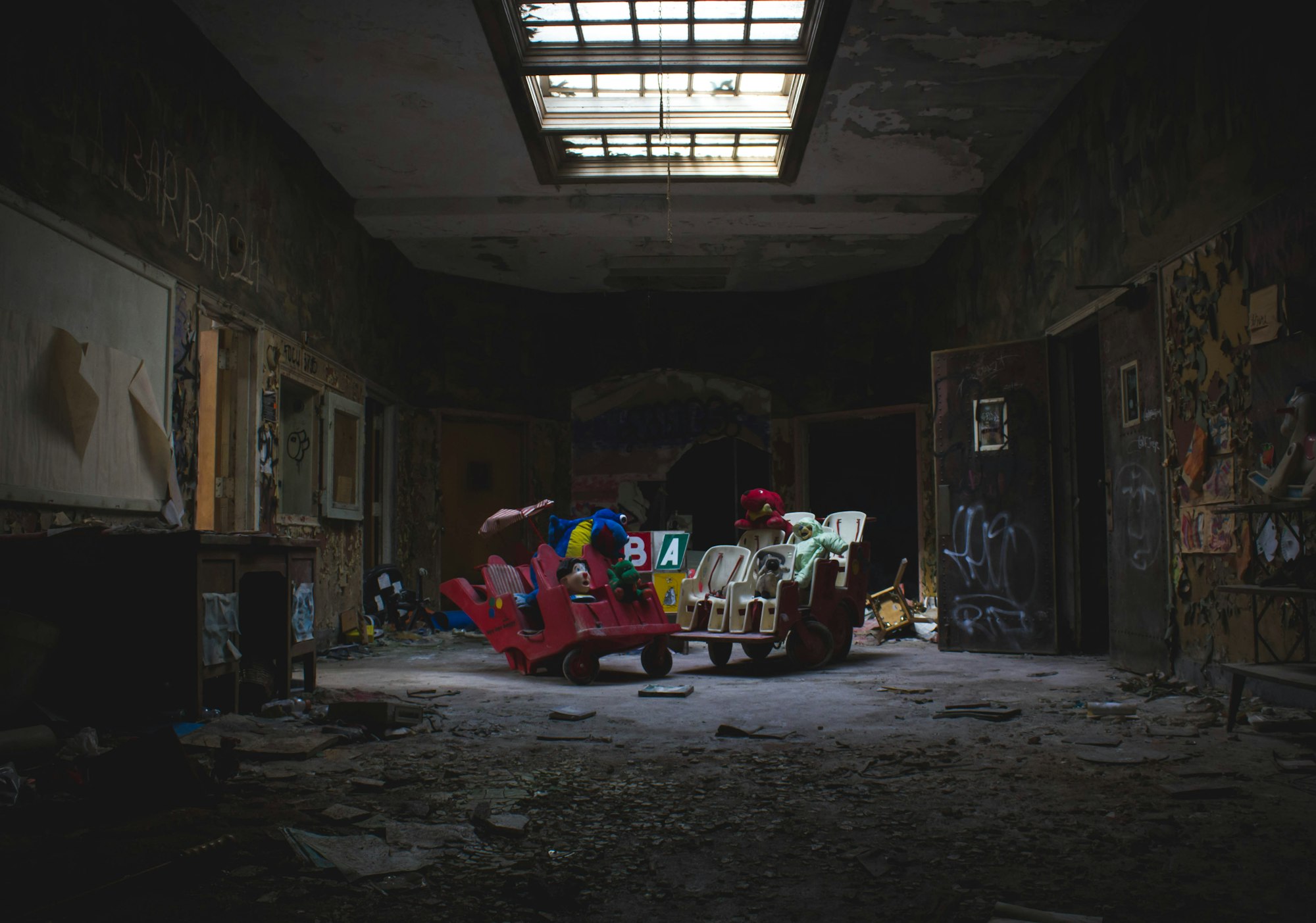52 Weeks of Writing: Week 49—Stare into the abyss long enough and it'll send you more paperwork.

I wake up and it’s dark but it’s also not. Two rooms overlap with distinctly different hues; one is my bedroom in the flat, with its exposed brickwork and plain off-white walls. The light cuts through the gaps between the blinds. It’s never entirely dark because the world outside is a city which is never precisely dark, only shades of dirty orange.

The first week of this strange journey into my past.

Week two.

Week three.
The other bedroom is the one I grew up in. My teenage bedroom, with its black walls and posters and heavy pine furniture. These two spaces blend and twist.
In the silent rising moment between sleeping and waking, I was hurled back into that old room. A specific moment: the start of a January term and I’d convinced my mother I was too sick to go to school. A headache or a cold. My dad was having none of it. He demanded I get up and go to school.
I was terrified. I went to school.
In my thirties, I woke up every day and for the first few minutes of every one of them I was thirteen and about to have to go to school.
I was having flashbacks. I remember this now. It came back to me, after recalling some other incident (a story for another time).
Problem, though. I didn’t tell anyone this was happening to me. Like executive functioning, like sensory sensitivity, I didn’t have the language for what was going on.
Perhaps if I’d sat with a doctor who had more time and more patience, who could comprehend that somebody with a lot of education could be so dementedly sick, things might have been different. But they’d have to know the right questions to ask of what I was experiencing.
I know very little about what I did, how I felt, what happened to me, for most of that year. If I had to go out of the flat, I might recall something, but I barely left. I was too afraid.
For some reason, I still kept a regular blog. I don’t remember what I wrote but I doubt it bore any relationship to my life. I was putting on a mask, I think. “This is only a temporary setback, there’s nothing wrong that won’t be fixed in a few months’ time.”
I’ve read a lot of people describe having episodes of depression, after this worst of phases was over, and compare my timeline to theirs. I was looking for permission to be sick, I think, permission to be as broken as I felt. “It took six months to recover!” Or “I was severely depressed for nearly a year!”
Time spooled out and I had no idea of its passing.
There was a time when I did nothing but go to the doctor to collect a sick note every month, then go home and lie down. Another period when I know I obsessively read crime fiction, collecting piles of books from the library every week—my only permitted outing, according to my blossoming paranoia—to read.
I don’t remember who the authors were. I don’t remember the plots. I don’t remember the stories, the characters. I do remember I didn’t get on with Ian Rankin. Sorry, Ian Rankin.
Books from the library were free and the library itself wasn’t far. I was convinced by the general media, government advertising and messaging, that agents were out there everywhere, hunting down benefit cheats. Had you been caught doing something your illness or disability said you couldn’t do? Then a bright white circle would surround you and the world would eat you alive.
I took this very much to heart.
Note: the rules of the benefits system are obscure and confusing. They were too at this time, when the message from the state was one about austerity and tightening of belts. They didn’t try the whole “it’s the disabled person’s ‘duty’ to find a job”. That’s new for 2023.
In 2010, we were all just on the brink of being criminals. Or so I felt.
The rules have changed now, the system has updated itself. When I crashed onto the conveyor belt of the benefits system, the disabled and chronically ill were being moved off incapacity benefit (IB) and onto employment support allowance (ESA). Acronyms in this world are everything and it was important to know which ones were which, because it affected everything else.
The ESA pipeline started with months on short-term sick, for which I required a sick note sent in with a form once a month. After six cycles of this, I had to face the dreaded ATOS “fitness for work” test.
What I remember: a stiff, stern woman with hawkish features who told me she was a psychiatrist and, when I said that yes, I was suicidal, remarked that I clearly hadn’t tried hard enough.
The waiting rooms were the indoor version of the line outside the Citizen’s Advice Bureau. We’d been dumped by the tide and sat in awkward heaps like abandoned trash bags on the world’s worst beach. There was a vending machine in the corner. We were overseen by receptionists who could have directed war zones.
But this is jumping ahead a little, because in those first six months I wasn’t assessed. I just needed a sick note. When not conducting this little act of administration, I did nothing but read these books or lie in bed. I brought a duvet downstairs and set it up on my sofa. Eventually, what I did was transition from bed to sofa and back again.
I write all this out and think to myself, “Why didn’t I say this was what I was experiencing?”
Why didn’t I say, “Every day I wake up and I’m thirteen and I’m terrified because I have to go to school again.” It would take me hours to get out of that daze, and then I only slid into another one, imagining whenever I left the house I was surrounded by a bright circle and a blinking light that said I was a benefit cheat because I was sick.
Other scattered memories:
I had one pair of functional shoes. I developed a strange tendency to fall down, which might have been because the heel on the shoes eventually broke.
Halfway up the road, approaching an elderly lady with a cloud of white hair and a little push-along shopping basket, I slithered to the ground. She stopped and stood over me and said, "Are you all right? Do you need help?"
Yes, I do. But I can't admit that I do. That I need somebody to pick me up and make all my decisions for me while I let the war in my head resolve.
You know, for the six or seven months in 2010 when I stopped talking to any of my friends, I kept a weekly blog? That in the months when my life was burning down in 2009, I did some kind of public talk? Performing for others allowed me to maintain the mask that was cracking on the inside.
I have no idea what I said. If I was to attempt to explain why I kept the blog, what I wrote and why, I would be inventing explanations, in the same way that people peer in at the behaviour of others on the internet, speculating and assuming. It's as if it all happened to somebody else. I have no way into my own head from that time.
So there's a blank, when I knew I existed but I can't explain myself, put words and meaning to my actions. All I have are these bare snapshots.
